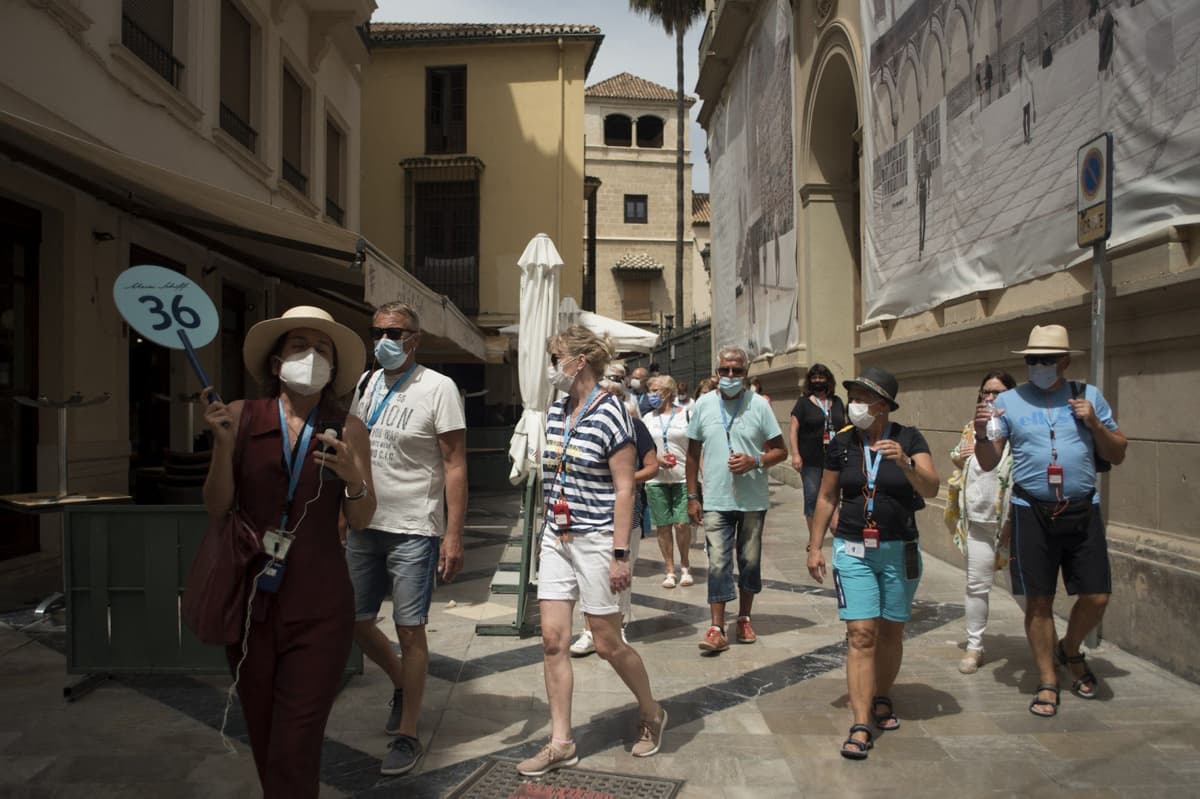“This used to be my home” (antes esta era mi casa) , “go f*cking home” (a tu puta casa), “stinking of tourist” (apestando a turista), “this used to be the city centre” (antes esto era el centro) and “Your dead loved ones, mayor” (Alcalde tus muertos) are some of the hostile messages recently adorning walls and doors in the Andalusian city of Málaga.
#Málaga 📰 El Centro se llena de pegatinas contra el turismo: «A tomar por culo de aquí». ✍ @ninaapin 📷 C. Pinto https://t.co/n8GTIT9S6z
— Diario SUR (@DiarioSUR) March 13, 2024
This “sticker initiative” was started by local bar owner Dani Drunko who runs a well-known bar in Málaga called Drunkorama, and who selected some of the most liked anti-tourism slogans from his followers and made them into stickers that now decorate Málaga city centre.
Drunko told local daily Diario Sur that he began the campaign after he was “kicked out” of the home he’d been living in for ten years, with the landlords refusing to negotiate the rent or sell him the property because they wanted to turn it into a short-term tourism rental.
“There’s a lot of hype because locals are tired of the situation; I just suggested the idea of the catchphrases, I offered the spark, and now others have joined,” Drunko added about how other campaign groups such as GuirisGoHome taking part as well.
READ ALSO: Is the Spanish word 'guiri' (foreigner) offensive?
“Málaga city centre has been going downhill for a long time, so much so that if for example something in my bar breaks, I don't have a hardware store on hand to buy anything, since the tourist who comes doesn’t need to buy screws”.
The Local Spain’s reporter Esme Fox, who last November wrote the article “Why Spain’s Málaga is becoming a victim of its own success”, has recently experienced the change to the Andalusian city first-hand.
“It's definitely busier than before during low season,” Fox explains.
“A few years ago I visited in August and it was busy as expected, but this time I visited in January and at night it seemed to be just as packed. It was just a regular Wednesday night and it’s as though a festival was taking place given the sheer amount of people in the streets and spilling out of bars.
“There are lockboxes for tourists to self-check at practically every building in the centre!
Antes to’ esto era Centro, como dice esta pegatina junto a varios pisos turísticos.
— Dani Pérez /❤️🇪🇺 (@aDanielPerez) March 12, 2024
Recorres las calles de #Málaga y es prácticamente imposible encontrar un edificio de viviendas que no tenga un candado y contraseña.
Pero @pacodelatorrep sigue sin mover un dedo por los… pic.twitter.com/27dGEf5rTT
“Prices have also increased significantly with regards to food. Tapas in Málaga city were more expensive than what I'm used to paying in Barcelona where I live.”
Spain’s Costa del Sol, where Málaga is located, received a record 14 million national and international holidaymakers in 2023, but its popularity is such that many foreigners are choosing to move there.
Eight out of 10 new residents moving to Málaga are currently foreigners, according to recent data from Spain’s National Statistics Institute (INE).
Google and 630 other tech companies have set up shop in Málaga in recent years as well, turning the city into the ‘Silicon Valley’ of Europe and drawing thousands of international remote workers and digital nomads for its combination of cosmopolitan work environment and quality of life under the sun.
Málaga is certainly going places, but as evidenced by this latest anti-tourism campaign, malagueños are angry about the fact that they’re being priced out and alienated from their home city.
READ ALSO: 'Beach closed': Fake signs put up in Spain’s Mallorca to dissuade tourists

Join the conversation in our comments section below. Share your own views and experience and if you have a question or suggestion for our journalists then email us at [email protected].
Please keep comments civil, constructive and on topic – and make sure to read our terms of use before getting involved.
Please log in here to leave a comment.